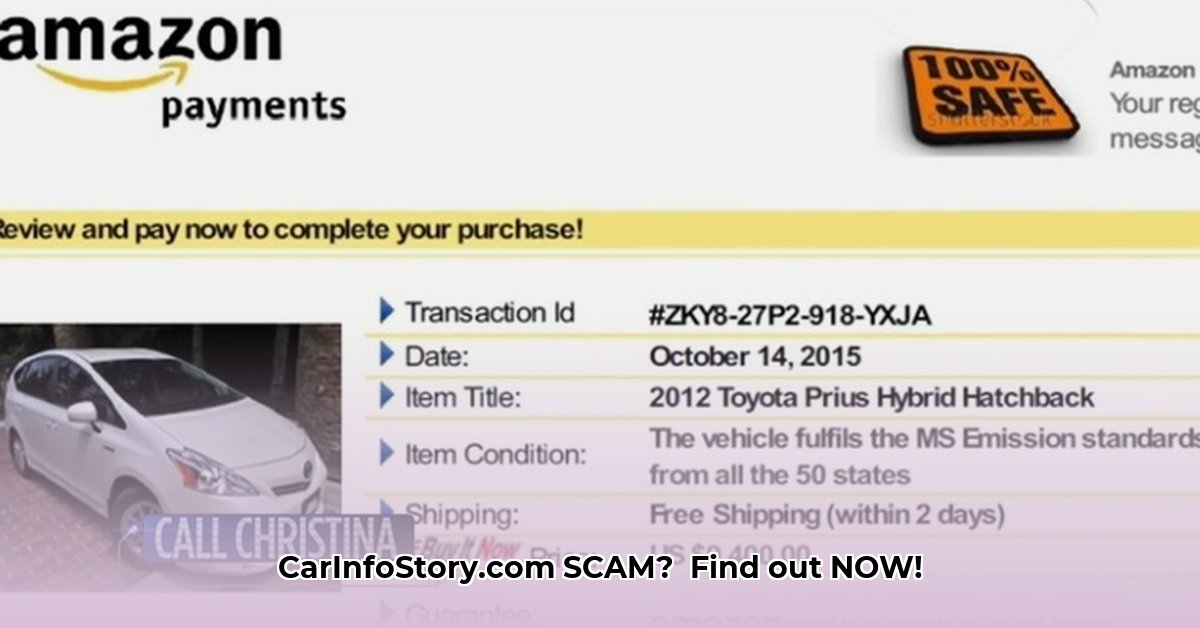
carinfostory.com: Dodging the Online Car Sales Trap
Selling a used car online is stressful enough without scammers lurking. Reports indicate a website, carinfostory.com, is targeting private sellers with a sophisticated bait-and-switch. This article explains how the scam works and provides concrete steps to protect yourself.
How the carinfostory.com Scam Plays Out
Imagine: you list your car online, and a buyer offers to cover the cost of a vehicle history report from carinfostory.com. Sounds reasonable, right? Wrong. This is a carefully crafted scam.
The site looks professional, but the reports are fabricated. After you pay, the buyer disappears, leaving you out of pocket. This isn't an isolated case; numerous sellers have fallen victim.
Unraveling the Scam's Simple Tactics
The carinfostory.com scam is deceptively simple but effective. Exploiting the common practice of vehicle history reports, it leverages the seller's desire for transparency. The website's professional design adds to the deception, making it appear trustworthy. Often, scammers add pressure—a sense of urgency—to increase their odds of success.
The scammers are not limited to one platform; they use popular sites like Craigslist, Facebook Marketplace, and Autotrader, targeting a wide audience. These platforms, while usually safe, lack the stringent buyer verification of dedicated car sales sites, making it easier for scammers to operate.
Spotting the Red Flags: Evidence and Warning Signs
Reports consistently point to key features: victims lose $30-$60 from demands for reports exclusively from carinfostory.com. The website itself is the scam; no legitimate equivalent exists. Have you ever encountered a buyer who insisted on a specific, lesser-known report provider? This could be a red flag.
Key warning signs:
- Unnecessary Report Demands: Genuine buyers rarely insist on a specific report provider.
- High-Pressure Tactics: Be wary of impatient or unusually pushy buyers.
- Generic Reports: Legitimate reports are detailed. A vague report is a major red flag.
- Buyer Disappearance: The buyer vanishes after payment.
Protecting Yourself: A Step-by-Step Guide
Awareness is your best defense. Here's how to safeguard yourself:
For Private Car Sellers:
- Trust Your Gut: If something feels wrong, it probably is. Don't rush into anything that makes you uncomfortable.
- Vet Your Buyers: Thoroughly check buyer profiles and reviews on the platform. Consider a brief interaction before proceeding.
- Reputable Services: Use established companies like Carfax or AutoCheck for vehicle history reports.
- Secure Payments: Use escrow services or conduct in-person transactions whenever possible.
- Stay Informed: Regularly check consumer protection websites and news sources for updates on online scams. Is this enough to protect yourself, or should you take additional precautions?
For Online Sales Platforms:
- Enhanced Verification: Implement stricter account verification processes to deter scammers.
- AI-Powered Detection: Utilize AI to identify potentially fraudulent activities.
- Seller Education: Provide clear warnings and educational materials about scams.
For Law Enforcement and Credit Card Companies:
- Collaboration: Share information to effectively track and shut down fraudulent operations.
- Streamlined Chargebacks: Make the chargeback process efficient and straightforward for victims.
The Broader Perspective
The carinfostory.com scam highlights the growing problem of online car sales fraud. We need stronger regulations, tighter platform security, and increased public awareness. Don’t let carinfostory.com—or similar scams—catch you off guard.
How to Avoid the CarInfoStory.com Scam
Key Takeaways:
- CarInfoStory.com is fraudulent. Its vehicle history reports are worthless.
- Scammers use it to pressure sellers into paying for fake reports.
- The scam relies on social engineering and urgency.
- Verification, reputable services, and caution are key to protection.
Understanding the CarInfoStory.com Scam
Imagine a seemingly legitimate buyer insisting on a CarInfoStory.com report. This is a classic scam; the report is worthless, and the buyer disappears after payment. The scam’s success depends on manipulating you into believing you need this specific report for a successful sale.
How the Scam Works: A Step-by-Step Breakdown
- Contact: A buyer contacts you through an online classifieds site.
- Report Demand: They insist on a CarInfoStory.com report.
- Payment & Delivery: You pay ($30-$60), receiving a worthless report.
- Disappearance: The buyer disappears.
How to Protect Yourself
Avoiding the CarInfoStory.com scam requires vigilance:
- Verify Buyer Identity: Don't blindly trust online interactions. Go beyond an email address.
- Reputable Services: Use established vehicle history report providers.
- No Pressure: Legitimate buyers don’t pressure you.
- Report Suspicious Activity: Report scams to the platform and authorities.
Technical Details and Evidence
Multiple sources confirm the reports' worthlessness. The website’s design and payment systems are carefully crafted to look legitimate, but ultimately, they are deceptive. The scammer's anonymity makes it difficult to stop them, but reporting is vital.
Taking Action: A Multi-pronged Approach
This scam requires a multi-faceted solution:
| Stakeholder | Action Steps |
|---|---|
| Private Sellers | Verify buyers, use reputable services, report scams, use escrow services. |
| Online Classifieds Platforms | Improve scam detection, buyer verification, and seller education. |
| Law Enforcement/Regulatory Bodies | Increase investigations, raise public awareness, improve collaboration. |
| Credit Card Companies | Improve fraud detection, expedite chargebacks, and enhance victim support. |
Your awareness is crucial. By following these steps, you can dramatically reduce your risk.